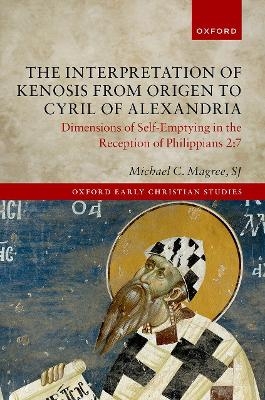
The Interpretation of Kenosis from Origen to Cyril of Alexandria
Oxford University Press (Verlag)
978-0-19-889666-1 (ISBN)
The self-emptying of Christ, proclaimed in the letter to the Philippians 2:7, remains a much-debated topic in modern theology and exegesis. The Interpretation of Kenosis from Origen to Cyril of Alexandria brings the insights of Greek Christianity to the understanding of kenosis to illustrate that new dimensions of the topic open up when it is examined in the historical era of early Christianity.
Origen of Alexandria showed that his understanding of kenosis allowed him to resist overly confining understandings of divine immutability, yet retain the conviction that the immutable Word's self-emptying calls the Christian believer to awe and wonder. Gregory of Nyssa found in kenosis a way to emphasize the Son of God's embrace of all of human life, including historical development. Cyril of Alexandria, finally, the term kenosis more than anyone else in Greek-speaking Christianity. It was a theme across all major eras and genres of his writing, from scriptural exegesis to doctrinal disputes, including those about the divinity of the Son and the natural union of the Son with human reality. Cyril found in kenosis an anchor point for two themes: first, that the strangeness and shocking quality of the term kenosis reminds the believer that God's categories always stretch beyond human "who emptied himself?" can only be answered by a single-subject Christology that proclaims the kenosis of the Word.
This book opens and closes with chapters relating early Christian teaching on Christ's self-emptying to modern scripture scholarship and to concerns of feminist systematic theology.
Michael C. Magree was born and raised in Ohio, USA, and attended Franciscan University of Steubenville. He then completed graduate work at the Ohio State University, Fordham University, and Boston College, before attaining a Ph.D. from the University of Notre Dame. His ongoing scholarly projects concern interpretation of the Bible in late antiquity, and the intersection of ascetical practice and Christological teaching. As a Jesuit priest, he seeks to foster knowledge of the early Church and bring it into conversation with contemporary concerns and with liturgical and spiritual life.
Abbreviations and Other Conventions
Introduction
1: Modern Exegesis of Philippians 2:6-7
2: Ancient Reading, and Kenotic Philanthropy in Origen
3: Philippians 2:7 in Eusebius and Athanasius
4: Self-Emptying in Focus: Basil of Caesarea and Gregory of Nyssa against Eunomius and Apollinarius
5: Self-Emptying in the Theology of Cyril of Alexandria
6: Conclusion
Bibliography
Index
| Erscheinungsdatum | 09.05.2024 |
|---|---|
| Reihe/Serie | Oxford Early Christian Studies |
| Verlagsort | Oxford |
| Sprache | englisch |
| Maße | 160 x 240 mm |
| Gewicht | 660 g |
| Themenwelt | Geschichte ► Teilgebiete der Geschichte ► Religionsgeschichte |
| Religion / Theologie ► Christentum ► Kirchengeschichte | |
| ISBN-10 | 0-19-889666-2 / 0198896662 |
| ISBN-13 | 978-0-19-889666-1 / 9780198896661 |
| Zustand | Neuware |
| Informationen gemäß Produktsicherheitsverordnung (GPSR) | |
| Haben Sie eine Frage zum Produkt? |
aus dem Bereich


